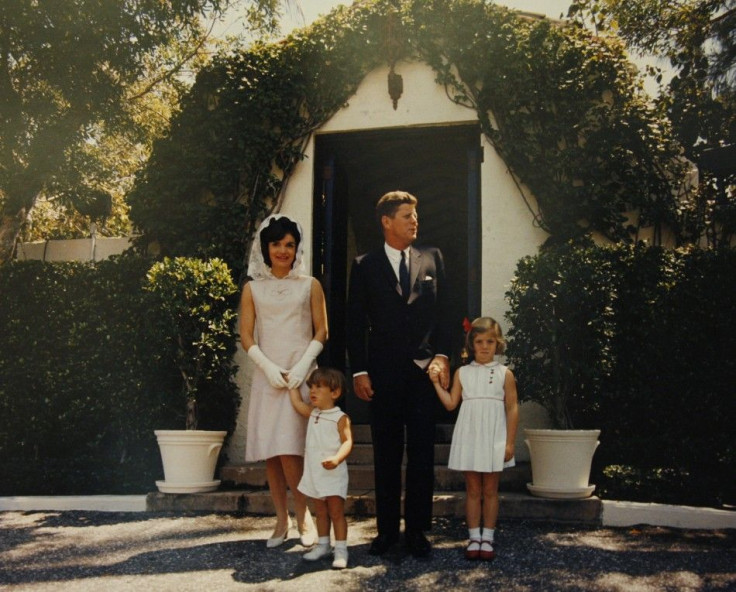Jackie Kennedy Tapes: First Lady Calls Martin Luther King, Jr. a 'Phony', Makes Other Candid Statements

Former First Lady Jaqueline Kennedy called Martin Luther King, Jr., a phony and had choice words for other leading figures of the 1960s, according to Jacqueline Kennedy: Historic Conversations on Life with John F. Kennedy, an oral history of the events surrounding John F. Kennedy's life and presidency scheduled to be released on Wednesday.
The book -- which is also being published as an audio recording -- is based off a series of interviews that Kennedy gave to Arthur M. Schlesinger Jr. in early 1964. The seven-part interview with Schlesinger, a historian and Kennedy aide, is one of only three that she gave following her husband's assassination in 1963 and spent nearly 47 years under lock and key. The interview discloses a side of the legendary first lady that only friends and family knew -- a woman who was inquisitive, funny and sometimes, quite cutting.
In a forward to the book, her daughter, Caroline Kennedy, wrote that her mother was in the extreme stages of grief at the time of the interviews. The tapes were intended to be sealed for decades and were among the last documents of Jackie Kennedy's private thoughts. She passed away in 1994 and, despite working as a high-profile literary editor in the 1970s and 1980s, never penned a memoir.
The book is being released in connection with an ongoing celebration of the 50th anniversary of President Kennedy's first year in office.
Jackie Kennedy Tapes: Candid, But Not Always
Throughout the interviews, Jackie Kennedy discussed her devotion to JFK, never mentioning a word about his reputation as a notorious womanizer, effectively upholding the Camelot myth she helped create.
Reflecting on her husband's campaign for the presidency, Kennedy said he never made her feel like a liability, even though she was having a baby and couldn't campaign and had a reputation for being a snob and hating politics, according to a recording obtained in advance by The New York Times. She said she was proud when she was embraced by the American public following JFK's election.
I was so happy for Jack, especially now that it was only three years together that he could be proud of me then, she said. Because it made him so happy - it made me so happy. So those were our happiest years.
In another account, Jackie Kennedy describes how she told her husband she would not be sent away during the Cuban Missle Crisis in 1962, when it seemed like the United States and Soviet Union were on the brink of nuclear war.
If anything happens, we're all going to stay right here with you, she remembered telling her husband. Even if there's not room in the bomb shelter in the White House ... I just want to be with you, and I want to die with you, and the children do, too -- than live without you.
The transcript and recording also some of Jackie Kennedy's candid -- and sometimes, acerbic -- observations several of her well-known contemporaries.
According to Kennedy, French President Charles DeGaulle was that egomaniac. She was also recorded as saying she could not look at Martin Luther King, Jr., without thinking...that man's terrible after the Civil Rights icon reportedly said a cardinal at JFK's funeral had been drunk and said the casket was almost dropped during the service, The Associated Press reports.
Moreover, Kennedy said King had arranged an orgy in a hotel while in town for the March on Washington in 1963, an event she said her husband urged her not be judgemental about. Despite her grievances, Caroline Kennedy told ABC's Diane Sawyer that her mother admired King later in life.
Although she would go on to give a well-known interview with Gloria Steinem's Ms. magazine a decade later, she expressed her suspicions regarding feminists, saying they preferred former Democratic presidential nominee Adlai Stevenson because they were, scared of sex.
JFK Comments on LBJ
In addition, both the president and the first lady apparently did not hold a high opinion of Vice President Lyndon B. Johnson, who would go on to pass The Civil Rights Act, legislation proposed by Kennedy himself in 1963.
Oh, God, can you ever imagine what would happen to the country if Lyndon was president? she quoted JFK saying of Johnson.
Jackie Kennedy presented herself as a traditional wife when discussing her marriage. She remarked that her union with JFK was rather terribly Victorian or Asiatic, and said her aim was to create an affectionate home and keep their children in good spirits. Although she said all of her opinions came from her husband,The New York Times points out that Michael Beschloss, a historian who composed an introduction and annotations to the book, said in an interview that he would take that with a warehouse of salt.
Instead, historians believe Kennedy may have been conforming to the conventional image of women at the time, especially since she knew she was speaking for the historical record as part of a larger oral history of the Kennedy presidency. Despite the revelations of the Schlesinger interviews, Jackie Kennedy's true opinions regarding her place in the legend of Camelot and its tragic ending will likely remain as it has been for nearly half a century: a mystery.
© Copyright IBTimes 2024. All rights reserved.











